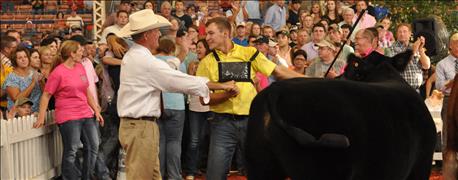
Following the 2015 Sale of Champions in which four animals initially tested positive for drug residues and two were ultimately disqualified, Illinois Department of Agriculture officials have redesigned their disqualification protocols for the 2016 Illinois State Fair.
“It’s the intent that all animals exhibited at the State Fair are drug free and representative of the highest-quality market animals that Illinois agriculture has to offer,” says Brian Sager, general livestock superintendent at the Illinois State Fair.
To that end, the Illinois Department of Agriculture will continue its urine analysis drug-testing protocol, but has redesigned its disqualification procedures.
Sager says immediately following the naming of champions at the Parade of Champions and Grand Champion Drive on Saturday, officials will collect urine samples from all champion and reserve animals, and from all Land of Lincoln champion and reserve animals. They may also randomly test non-champions.
Officials will send samples to the University of Illinois for analysis. Sager explains, “If a sample tests positive, those animals will be subject to disqualification.”
Sager says those exhibitors will have the right to a hearing through the Department of Agriculture, should they choose to contest the disqualification. It is the Department’s intent to hold a disqualification hearing prior to the Sale of Champions late Tuesday.
If an animal is disqualified, the reserve champion will become champion; no reserve will be named.
In 2015, champions underwent tissue testing and urine testing. After all test results were received, the exhibitors were notified of disqualification. The exhibitors could then re-test the samples and request a hearing. This extended the process to February and beyond.
“It was a painfully long process,” Sager says, adding it was difficult for all the families and officials involved. “The Department wants clear decisions made quicker this year.”
What happened in 2015
In 2015, both the Grand Champion Barrow and the Grand Champion Meat Goat Wether were ultimately disqualified.
The Grand Champion Barrow, which sold for a record-breaking $76,500 to the CME Group, failed the urine test and eyeball tissue test. A second eyeball tissue test, conducted at a laboratory of his choice, also later tested positive. The exhibitor agreed to disqualification and forfeited his prize; The CME Group instead split the money between Illinois 4-H and Illinois FFA.
The Grand Champion Meat Goat Weather, which sold for $5,450 to Holder’s Hill Meat Goats and Friends of the exhibitor, failed the initial test, and failed a follow-up urine test at a laboratory of the exhibitor’s choice. An administrative hearing was held and the disqualification was upheld. Prize money was returned to the bidder.
The 2015 Grand Champion Steer and Land of Lincoln Grand Champion Barrow also failed initial testing, but were subsequently cleared and were not disqualified.
The Grand Champion Steer, which sold for $65,000 to AT&T, Monsanto-DeKalb-Asgrow and Friends of the exhibitor, failed initial tests. Correspondence from the exhibitor’s veterinarian confirmed therapeutic drug use and prize money was awarded.
The Land of Lincoln Grand Champion Barrow, which sold for $35,000 to Brandt and Friends of the exhibitor, also failed initial tests. However, the exhibitor’s veterinarian again confirmed therapeutic drug use and prize money was awarded.
Sager says those are the scenarios they want to avoid in 2016.
“The administration at the Department of Agriculture and the Illinois State Fair is very interested in assuring that the market animals exhibited at the state fair are quality meat animals, free of drug residues,” he concludes.
About the Author(s)
You May Also Like






